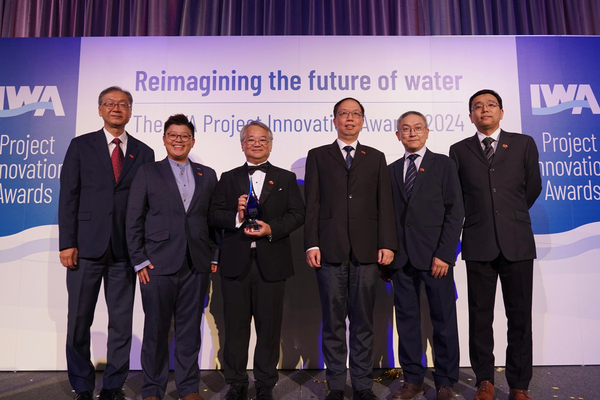Sewage surveillance project awarded

Director of Environmental Protection Samuel Chui (third left) attends the awards gala dinner at the International Water Association’s World Water Congress & Exhibition in Toronto.
Hong Kong’s sewage surveillance programme won the Gold Award in the 2024 International Water Association’s (IWA) Project Innovation Awards under the "Performance Improvement & Operational Solutions” category, the Environmental Protection Department (EPD) announced today.
The EPD pointed out that the conferral of such an award fully recognises the Hong Kong Special Administrative Region Government’s innovative spirit and outstanding technological achievements in using sewage surveillance to help combat the COVID-19 epidemic.
It also noted that an interdepartmental team, comprising the EPD, the Drainage Services Department and the Department of Health, implemented a unique city-wide programme to fight COVID-19 by using sewage surveillance to provide important data during the most severe epidemic situation in Hong Kong, and it brought about significant socio-economic benefits.
The Awards Gala Dinner was held at the IWA World Water Congress & Exhibition in Toronto, Canada. The Director of Environmental Protection Samuel Chui, together with Deputy Director of Drainage Services Robin Lee and the Department of Health’s Principal Medical & Health Officer Dr Kung Kin-hang, led a delegation to receive the award.
Mr Chui said: "Standing out from 108 submissions worldwide, the programme showcases that the Hong Kong SAR Government is keen to apply an innovative spirit that incorporates water research in public health control strategy in developing a framework that not only suits Hong Kong, but is also applicable to other places in the world. The achievements are internationally recognised.”
The sewage surveillance programme detected the viral concentration of the SARS-Co V-2 virus in the sewage network through a non-intrusive way, covering about 80% of Hong Kong's population during the COVID-19 epidemic, the EPD explained.
Furthermore, the programme effectively traced the source of the virus in different anti-epidemic phases and served a sentinel surveillance function that enabled the Hong Kong SAR Government to keep track of the activity of the virus in the community and the prevalence of its variants.
During the fifth wave of the epidemic, the team developed two statistical models using a large amount of sewage virus data, which could predict the number of new cases in real-time two to four days ahead to assist in formulating anti-epidemic strategies and measures.
Looking ahead, the EPD said the scope of sewage surveillance will be expanded to cover other infectious diseases, such as seasonal influenza, in a stepwise manner, with a view to the early identification of risks arising from different infectious diseases for the formulation of appropriate public health measures.